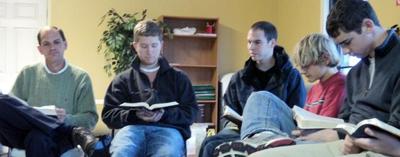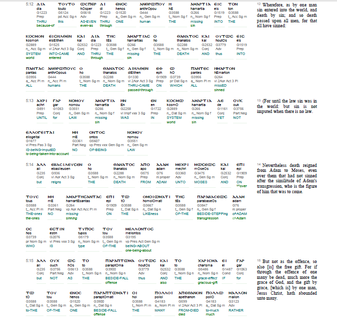
Prior to presenting what the Scriptures had to say on the matter, it was first necessary to define precisely what The Original Sin Doctrine was, what it stipulated, and see how different people perceived the matter through reputable resources. Granted, there are so many different views on this particular doctrine; thus, whenever a person makes mention of The Original Sin Doctrine, it should be well understood that this doctrine is primarily a compilation of several beliefs, and no one belief is any less important in formulating the total sum of this doctrine since doctrine is “set of beliefs held and taught by a Church”(OED 2013). In this instance, this study discusses The Original Sin Doctrine as it is proclaimed by Roman Catholic Church since it was this organization which formulated this Church Doctrine to counteract Protestant Reformers.
Though some may maintain true to only one of the following beliefs that may be perceived as the total sum of The Original Sin Doctrine, the fact of the matter is that this particular doctrine stipulates:
1. Each individual inherited Adam’s sins and are equally guilty of his actions,
2. Each individual is held accountable for Adam’s wrong doing,
3. Every single person is being punished because of Adam’s mistake,
4. Though each individual has a free will, mankind’s free will is tainted with sin,
5. No single individual can determine for themself the Heavenly Father’s will,
6. Only a religious organization can determine G-d’s will and dispenses it as such, which give rise to the several other doctrines like them Predestination & Grace,
7. Sin is an undefined, a preset condition,
8. Children who die without being baptized are punished because they’ve inherited Adam’s sins,
9. Forgiveness of sins can only be achieved by baptism.
Though some may maintain true to only one of the following beliefs that may be perceived as the total sum of The Original Sin Doctrine, the fact of the matter is that this particular doctrine stipulates:
1. Each individual inherited Adam’s sins and are equally guilty of his actions,
2. Each individual is held accountable for Adam’s wrong doing,
3. Every single person is being punished because of Adam’s mistake,
4. Though each individual has a free will, mankind’s free will is tainted with sin,
5. No single individual can determine for themself the Heavenly Father’s will,
6. Only a religious organization can determine G-d’s will and dispenses it as such, which give rise to the several other doctrines like them Predestination & Grace,
7. Sin is an undefined, a preset condition,
8. Children who die without being baptized are punished because they’ve inherited Adam’s sins,
9. Forgiveness of sins can only be achieved by baptism.

Now, some might imagine that in order to disprove a doctrine, an argument for each of these different belief structures which formulate the doctrine must be presented. This concept is untrue. Prior to accepting or rejecting a doctrine, it is important to go back to the original writer’s work and understand the original idea that he was trying to portray. Also, it’s important to check the hermeneutics, see if the entire Bible (from Genesis to Revelations) presents this same idea repetitiously. Then, the Bible enthusiast may have to define biblically sin and see if Adam’s wrongdoing is in complete contrast to said biblical definition. Lastly, if the Bible enthusiast chooses to, he may go through each one of these beliefs to see if the Bible either supports or reject these views.
Instead of going through all of these different beliefs that formulates the foundation of The Original Sin Doctrine, this study presents two points of interests. This study first identifies the author’s original intent in what he wrote. Secondly, this study defines sin and compares it to Adam’s actions to see if it is so. Afterwards, this study share some final thoughts. Prior to defining sin, it’s first important to review what the author said and what he meant. Most would argue that the New Testament was originally written in Greek. So, let’s entertain this idea! Let’s review what the Greek Scriptures say.
Instead of going through all of these different beliefs that formulates the foundation of The Original Sin Doctrine, this study presents two points of interests. This study first identifies the author’s original intent in what he wrote. Secondly, this study defines sin and compares it to Adam’s actions to see if it is so. Afterwards, this study share some final thoughts. Prior to defining sin, it’s first important to review what the author said and what he meant. Most would argue that the New Testament was originally written in Greek. So, let’s entertain this idea! Let’s review what the Greek Scriptures say.

Now, I’m not a Greek scholar; however, any person with a good head on their shoulders would know where to go to research this information. Most believers in the teachings of Messiah Yeshua would go to a dependable resource. It’s not necessary to be a Greek scholar; just be able to draw the relevant information needed to present the point to be made. This study would now like to draw your attention to an interlinear Bible that anyone with an internet access can refer to and see for themselves (Scriptures4all 2013).
In the Interlinear Bible, the Bible enthusiast may first notice what the literal translation reads: “Through this, even as through this one human the missing into the system came into, and through this (that was) missing the death and thus into all humans the death came through on all missed” (Scriptures4all 2013). Anyone who speaks English can immediately notice two things. Firstly, an immediate translation from the Greek into the English just simply doesn’t make sense. Secondly, the term was not the original intention that was used in the Greek language; it later became that possibly because Church Doctrine defined the missing into the system as sin.
In the Interlinear Bible, the Bible enthusiast may first notice what the literal translation reads: “Through this, even as through this one human the missing into the system came into, and through this (that was) missing the death and thus into all humans the death came through on all missed” (Scriptures4all 2013). Anyone who speaks English can immediately notice two things. Firstly, an immediate translation from the Greek into the English just simply doesn’t make sense. Secondly, the term was not the original intention that was used in the Greek language; it later became that possibly because Church Doctrine defined the missing into the system as sin.
 Something that was missing in Adam's life brought his death.
Something that was missing in Adam's life brought his death. So, if something was missing, what was it? The Greek noun used is ἁμαρτία (Strong's G266 - hamartia) which primarily means “to be without a share in(something).”It also means “to miss the mark,” “to err, be mistaken,” “to miss or wander from the path of uprightness and honour, to do or go wrong” as well as “to wander from the law of G-d, violate G-d's law, sin.” According to the fifth definition which is least commonly understood, hamartia means to wander away from Elohim’s Torah, violate said Torah thus missing the mark, sin; however, most would discredit the notion that wandering away from Torah would result in sin because the idea that Adam had a Torah scroll seem incomprehensible (reference Romans 5:12-4).
What system, then, was missing in order for death to be Adam’s end result? It’s quite possible to entertain the idea that Adam’s removal from Paradise conditions resulted in his death, a condition that later transcended down his descendants. The interesting thing is that Torah reveals exactly what was missing: “Then the L-RD G-d said, ‘Look, the human beings have become like us, knowing both good and evil. What if they reach out, take fruit from the tree of life, and eat it? Then they will live forever!’” (Genesis 3:22). Later on, John informs us that this tree of life will once again be part of the system that mankind will reside in (reference Revelation 22:1-7).
What system, then, was missing in order for death to be Adam’s end result? It’s quite possible to entertain the idea that Adam’s removal from Paradise conditions resulted in his death, a condition that later transcended down his descendants. The interesting thing is that Torah reveals exactly what was missing: “Then the L-RD G-d said, ‘Look, the human beings have become like us, knowing both good and evil. What if they reach out, take fruit from the tree of life, and eat it? Then they will live forever!’” (Genesis 3:22). Later on, John informs us that this tree of life will once again be part of the system that mankind will reside in (reference Revelation 22:1-7).
After reviewing what the author said, this study will now review what the Bible says about sin.
 In Hebrew, sin occurs when a person misses the target.
In Hebrew, sin occurs when a person misses the target. The New Testament is quite clear to mention that sin is lawlessness (reference 1 John 3:4-10). In fact, sin depends on two conditions. The first condition is where an individual lives life without Torah. The second condition is when an individual purposely violate Elohim’s commandments as prescribed in Torah. Did Adam live life without Torah? Yes, he had eternal life conditions even without Torah, but his disobedience to Torah was not was constituted him as being excluded from Paradise’s Tree of Life(reference Romans 5:12-4). Did Adam purposely violate Torah? According to Paul, Adam did not purposely violate Torah since Torah was given at Mount Sinai and not at the Garden of Eden as Paul noted: “Nevertheless death reigned from Adam until Moses, even over those who had not sinned in the likeness of the offense of Adam […]” (Romans 5:14).
Unlike The Original Sin Doctrine, Paul admits that death came upon those who didn’t even sin! What, then, is Paul admitting? Paul himself is admitting that mankind did not inherit Adam’s offense, guilt, or punishment. He mentions that there were those who had not sinned yet suffered mortality.
This study will now conclude with the following thought.
Many are under the impression that they’re held accountable over somebody else’s actions. The fact of the matter is that this is not the original intent of Scriptures. On the contrary, the Bible reveals that something is missing in order for mankind to enjoy eternal life conditions. As previously read in Revelation 22:1-7, eternal life’s condition is dependent upon what Messiah will dispense upon mankind, access to the Tree of Life.
Unlike The Original Sin Doctrine, Paul admits that death came upon those who didn’t even sin! What, then, is Paul admitting? Paul himself is admitting that mankind did not inherit Adam’s offense, guilt, or punishment. He mentions that there were those who had not sinned yet suffered mortality.
This study will now conclude with the following thought.
Many are under the impression that they’re held accountable over somebody else’s actions. The fact of the matter is that this is not the original intent of Scriptures. On the contrary, the Bible reveals that something is missing in order for mankind to enjoy eternal life conditions. As previously read in Revelation 22:1-7, eternal life’s condition is dependent upon what Messiah will dispense upon mankind, access to the Tree of Life.
© 2013 Nehr HaOlam Publications
Winslow, New Jersey, USA
All Rights Reserved.
Unless otherwise indicated, all Scriptures were taken from the New Living Translation of the Bible.
For more information, contact [email protected].
Winslow, New Jersey, USA
All Rights Reserved.
Unless otherwise indicated, all Scriptures were taken from the New Living Translation of the Bible.
For more information, contact [email protected].

 RSS Feed
RSS Feed